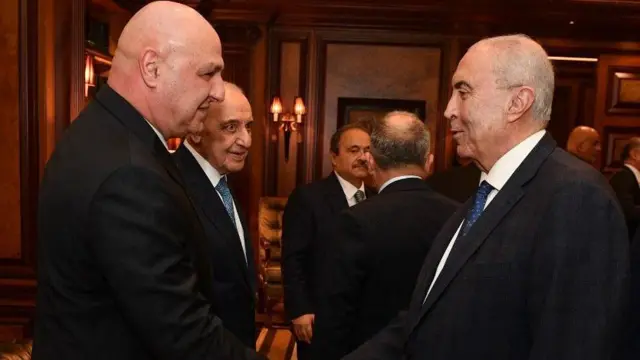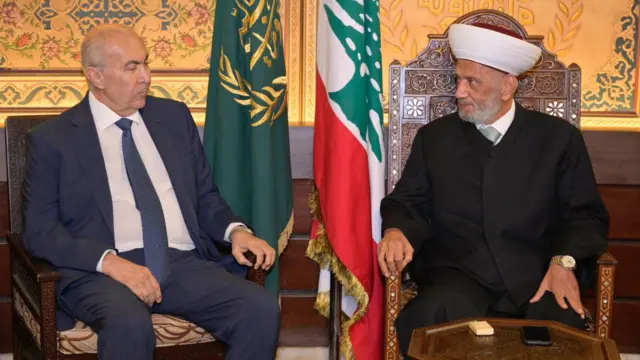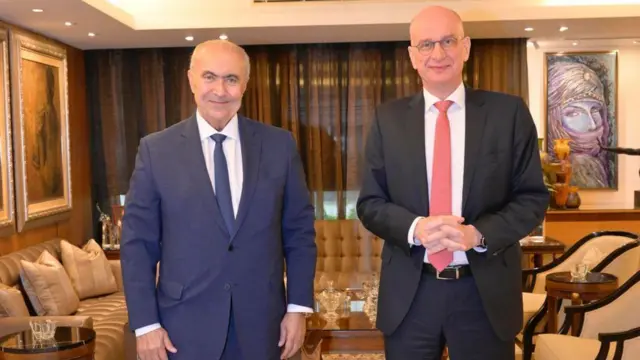
image source, Social Media
Fouad Makhzoumi, the Lebanese businessman and politician, has become the focus of attention of the Lebanese to complete the presidential elections in the country, after the opposition nominated him to lead a new government, following the success in ending the presidential vacuum and choosing Joseph Aoun as president of the country.
The Lebanese opposition issued a statement in support of Makhzoumi, the founder of the National Dialogue Party and a member of the opposition Renewal Bloc, before the date of parliamentary consultations to complete the construction of the authority, expected on Monday. 31 deputies signed the nomination statement, within the opposition bloc, which includes representatives of the Forces and Phalange, independents, changers, and the Renewal Bloc, which belongs to… To him Makhzoumi.
Al-Makhzoumi adopts a moderate political approach towards Lebanon’s interior and towards Lebanon’s Arab region regionally. He said in a post on the X platform on December 3, “What is required today is the formation of a political class run by clean-minded individuals who have not been involved in the files of financial and political corruption and quotas, and who have the ability to Bringing people together with a unified discourse based on citizenship and building a state of law and institutions.”
He also stressed the necessity of working to “rebuild confidence, strengthen relations with the Arab and international communities, and attract Lebanese investors in particular and Arab investors in general.”
This page contains content from Twitter. Your consent is required before viewing any material as it may contain cookies and other technical tools. You may prefer to view Cookie Policy For Twitter And privacy policy Before approval. To view the content, select Agree and Complete
Warning: The BBC is not responsible for the content of external websites
End of Twitter post, 1
From opposition to power

image source, Social Media
Makhzoumi has been one of the most prominent members of the Lebanese opposition since his election to the Lebanese Parliament in 2018. He has always rejected the presence of weapons in the hands of factions and parties and was one of the most vocal critics of Hezbollah’s weapons.
He said in a previous statement to a Lebanese channel on December 3, “We entered into a war that is not our war, and there is no doubt that the Palestinian issue is the issue of all of us, and Lebanon has paid the price of civil wars more than once for the process of supporting the Palestinian cause and the war that began on October 8 with an announcement from Hezbollah should not have been involved in it.”
As he said in a meeting with the Mufti of the Lebanese Republic, Abdel Latif Derian, in Dar al-Qatwa, last December, “I stressed before His Eminence that what is required today is for everyone to be under the protection of the state and for the decision of war and peace not to be in the hands of a specific party or faction, but rather in the hands of the state only.” .
Al-Makhzoumi stressed that he was one of the “strongest opponents” of what was called the “war of support” from its beginning, “and I demanded that we not be drawn into a war that has nothing to do with us, and all hope now is that no one will open a new war of support for Syria.”
This page contains content from Twitter. Your consent is required before viewing any material as it may contain cookies and other technical tools. You may prefer to view Cookie Policy For Twitter And privacy policy Before approval. To view the content, select Agree and Complete
Warning: The BBC is not responsible for the content of external websites
End of Twitter post, 2
He also previously called for the need to limit weapons to the army, and said in a previous post on the To protect the country and its people and promote stability.”
He added in the post, “We call on all reasonable people to trust the Lebanese legitimate forces with their responsibilities, and to stand behind them in this mission, which enjoys the support of the Lebanese, and the support of the Arab and international communities.”
This page contains content from Twitter. Your consent is required before viewing any material as it may contain cookies and other technical tools. You may prefer to view Cookie Policy For Twitter And privacy policy Before approval. To view the content, select Agree and Complete
Warning: The BBC is not responsible for the content of external websites
End of Twitter post, 3
Businessman and politician

image source, Social Media
According to the information available about Fouad Makhzoumi, he was born in Beirut to a Sunni family in 1952, graduated from International College in 1970, and obtained bachelor’s and master’s degrees in chemical engineering from Michigan Tech University in 1975.
In the same year, he married Mrs. Mai Nomani, and had three children, Tamara and Camellia, and his eldest son, Rami, died in 2011.
In 2004, he founded the “National Dialogue” party. He also founded the opposition “Renewal” bloc after winning the legislative elections and entering parliament in 2018. In addition to him, he founded MPs Ashraf Rifi and Michel Moawad.
He began his working life in Saudi Arabia in 1975, and in 1984 he bought a holding company under the name “Future Management Holding”, which is known today as “Future Group Holdings”, in addition to establishing the Future Pipe Company.
He also established the Makhzoumi Service Foundation in 1997, which is a “non-profit organization aiming to develop civil society in Lebanon” in the areas of vocational training, health care, small loan programs, and other fields.
ظهرت في الأصل على www.bbc.com
